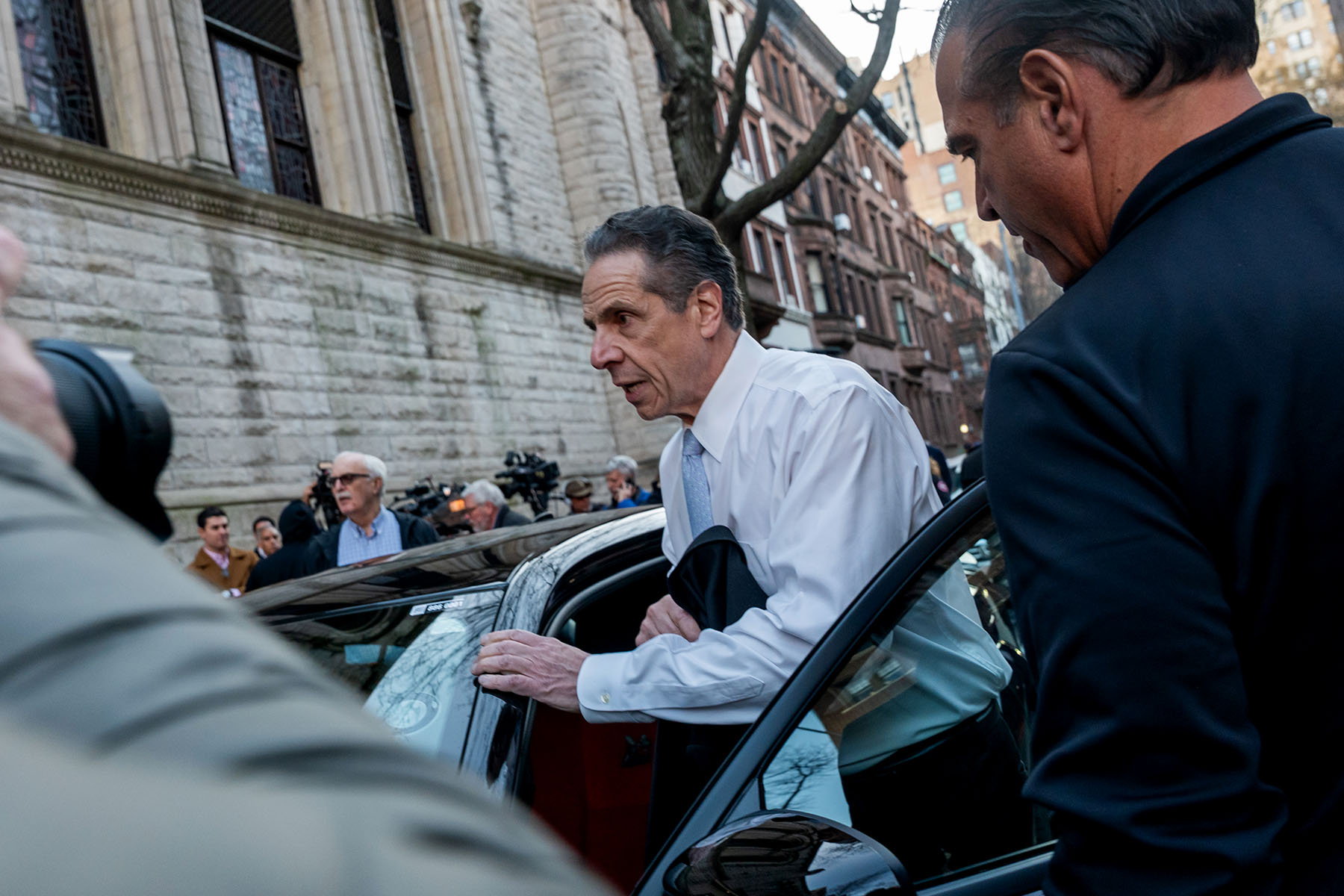In Albany, New York legislators are ending their session without passing two measures that would provide new protections for survivors of sexual misconduct within and outside of the workplace.
Meanwhile, in New York City, the former governor who resigned in the wake of sexual misconduct allegations could be weeks away from achieving a political comeback in his mayoral bid.
Andrew Cuomo left office in August 2021, a week after a 165-page report overseen by the New York attorney general’s office found he harassed 11 women and presided over a “hostile work environment for women” with a culture driven by “fear and intimidation.” At that point, he was apologetic and expressed remorse for being overly familiar with women while denying the most serious allegations against him. But as Cuomo has reentered the political arena, he has cast himself as the victim of “cancel culture” and investigations that he says were politically motivated and fundamentally flawed. He now says he regrets resigning as governor to avoid the distraction of an impeachment inquiry.
A number of elected officials who called on him to resign seem to agree with him and have endorsed him for mayor.
“There are very short memories,” said Emma Davidson Tribbs, the co-founder and director of the National Women’s Defense League, which seeks to combat sexual misconduct in state legislatures. “And that’s not just frustrating for the movement, but it’s so harmful for survivors, and reinforces this idea that even if you come forward, the system is not going to change.”
Some legislators have pointed to the aftermath of accusations against Cuomo as they push to change rules that they say are unfair to survivors of sexual misconduct.
The New York Speak Your Truth Act seeks to shield accusers from defamation lawsuits intended to silence them. Such lawsuits proliferated in the wake of the #MeToo movement, posing another barrier to speaking out.
Another measure would ban the use of no-rehire clauses in settlements. Also known as “don’t darken my doorstep” clauses, such provisions bar those who settle from future employment with the employer and were used to ban a Cuomo accuser from working in New York’s Executive Chamber again.
New York state’s legislative session is concluding for the year without either bill advancing to Democratic Gov. Kathy Hochul. That’s for a variety of reasons, advocates say, including logistical ones like the timing of the state budget. Powerful business interests in the state have “a lot of resources” to lobby against legislation that would benefit workers, like a ban on no-rehire clauses, said Erica Vladimer, a former legislative staffer and founding director of Harassment-Free New York.
The spectre of Cuomo’s return to power also looms large. The allegations against him have bolstered the visibility and salience of these bills, but also the potential risks in alienating a mayoral hopeful known for a hard-charging, confrontational approach to politics and engaging in long-running political feuds.
“I would argue it’s caused more fear to move it,” said Assemblymember Jessica González-Rojas of the New York Speak Your Truth Act, which she sponsored. “I think people are fearful of Cuomo, unfortunately.”
A Cuomo campaign spokesperson did not respond to a request for comment for this story.
New York City’s Democratic primary will be held June 24 and conducted with ranked-choice voting. Polls show Cuomo and Assemblymember Zohran Mamdani of Queens, a 33-year-old self-identified Democratic socialist, in the lead.
While not a major focus of the race, which has centered on affordability, crime and public safety, Cuomo’s scandals and legal battles have still come under scrutiny, especially from Mamdani. “To Mr. Cuomo, I have never had to resign in disgrace,” Mamdani said in Thursday night’s mayoral debate in response to criticisms that he was too inexperienced.
“I have never hounded the 13 women who credibly accused me of sexual harassment. I have never sued for their gynecological records,” he said. “And I have never done those things because I am not you, Mr. Cuomo.”
Conversations about sexual harassment in New York politics gained traction during the height of the #MeToo movement, as several former state legislative staffers spoke out and formed the New York Sexual Harassment Working Group, now Harassment-Free New York.
The group has notched some big legislative wins. In 2022, New York lawmakers passed the Adult Survivors Act, which allowed the advice columnist and writer E. Jean Carroll, who accused President Donald Trump of raping her in the 1990s, to bring forth her lawsuit against Trump. In separate but linked civil trials, juries found Trump liable for sexually abusing and defaming Carroll.
Trump was reelected to the White House in November, amidst a broader cultural backlash to the #MeToo movement. “Pendulums always swing hard from one side to the other,” Vladimer said. “But that is not any reason to think that the work is ending.”
Democratic state lawmakers have been pushing legislative reforms to those parts of the system they say are weaponized against sexual misconduct survivors, like Charlotte Bennett, a former executive assistant and health policy aide who accused Cuomo of sexual harassment and inappropriate behavior. He has denied her allegations.
Bennett withdrew a lawsuit against Cuomo in December after what her lawyer Debra Katz called “an astonishing number of invasive discovery requests and outrageous statements” that Cuomo filed “to embarrass and humiliate her,” including seeking records from her gynecologist. In a statement at the time, Bennett said that “throughout this extraordinarily painful two-year case, I’ve many times believed that I’d be better off dead than endure more of his litigation abuse.”
Cuomo’s attorneys called Bennett’s lawsuit “baseless” and said her decision to drop it before she was set to be deposed “should be viewed as a complete capitulation.” Ten days later, Cuomo moved to sue her for defamation — six months later, he has not followed through with a lawsuit.
“Charlotte Bennett represents thousands of other women and survivors that experience this kind of fear. It’s not just her story of going up against one of the most powerful men in New York State, perhaps the country,” said González-Rojas. “There’s so many stories that are untold, that are not with these powerful men, but still up against systems that don’t support justice and allow for these defamation lawsuits. Her story is very inspiring, but I want to be clear this is not about Cuomo alone.”
Lawyer and law professor Victoria Burke, driven by her own personal experience, has championed the passage of versions of the Speak Your Truth Act in states around the country to extend anti-Strategic Lawsuit Against Public Participation, or SLAPP, laws to survivors. Lawyers for actor Blake Lively invoked California’s version of the law in their motion to dismiss a defamation countersuit filed by “It Ends With Us” director and actor Justin Baldoni in the two stars’ ongoing legal battle over Lively’s claims that Baldoni sexually harassed and retaliated against her.
Burke argues the bill still provides due process for those accused of sexual misconduct, but gets the law more in line with free speech in the 21st century.
“It disincentivizes these meritless, frivolous lawsuits. Because many times when these lawsuits are brought forward, they, surprisingly, are not brought forward to win and to prevail,” she said. “They’re brought forward to bully, silence, intimidate and financially cripple someone speaking out, because it’s always cheaper to go silent.”
When Bennett settled a separate lawsuit with the state of New York (to which Cuomo was not a party), her settlement included a provision barring her from future employment with New York’s Executive Chamber. Vladimer called the stipulation “deeply unjust and victim blaming.”
“We cannot afford as a state, as a country, to push out really good public servants,” she said. “You don’t make a lot of money being a public servant. And so the fact that we would try and bar anybody who wants to dedicate their life to public service is just beyond me.”
The voices of survivors, said Harassment-Free New York’s Vladimer, aren’t going away anytime soon. And the National Women’s Defense League’s Davidson Tribbs argued that regardless of the outcome of the mayoral race, the opportunity is ripe for a broader reckoning.
“I think it is the perfect time for a state like New York or others to examine where the breakdown is in the system that allowed this kind of behavior to go on as long as it did in Albany and in other offices,” she said. “It’s the perfect example of what happens if we don’t stop this behavior from the get-go and hold people accountable.”






